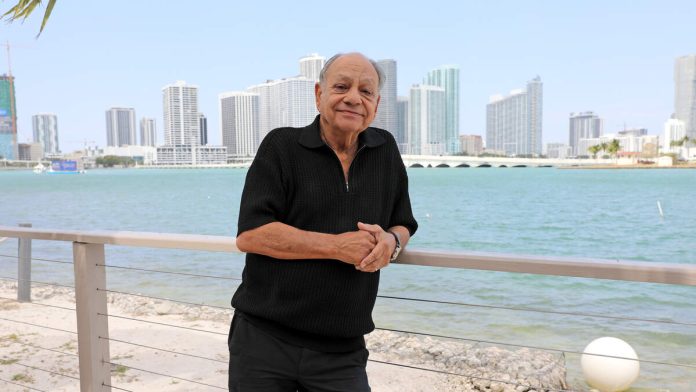LOS ANGELES (CNS) – The City Council proclaimed Friday “Cheech Marin Day” in Los Angeles to honor the Chicano comedian, actor and art collector, coinciding with the third anniversary of The Cheech Marin Center for Chicano Art & Culture in Riverside.
City Councilman Hugo Soto-Martinez led a presentation in the Council Chambers to recognize Marin, which the councilman expressed was important during challenging times here in the city.
In April, the councilman introduced a resolution to celebrate Marin, which was unanimously adopted by the City Council.
“Many of us look to the past to remind ourselves that the immigrant community has been here before, and they have always found a way to fight back with courage, creativity and community,” Soto-Martinez said.
“I have the honor of standing here with a person who embodies that spirit, a Chicano legend, Mr. Cheech Marin himself.”
Marin was born in South Los Angeles and raised in the San Fernando Valley, graduating from Bishop Alemany High School and what is now Cal State Northridge.
“I call on all the artists right now, especially those Chicano artists who are going through this with the rest of us,” Marin said, referring to federal immigration operations in the city. “It is time to now let us hear from you through your art to weigh in on this things that are happening right now.”
Marin emphasized that Latinos are a big part of the community and that cannot be disrespected.
He formed the comedy duo Cheech & Chong in the early 1970s with his friend Tommy Chong, recording seven studio albums and making six films together before the duo disbanded in 1985.
Marin made his directorial debut in 1987 with “Born in East LA,” which he also starred in. He appeared in many of Robert Rodriguez’s films, including the last two installments of Rodriguez’s “Mexico” trilogy, the “Spy Kids” trilogy, “Machete” and “From Dusk Till Dawn.”
Marin was also a cast member in the 1996-2001 CBS crime drama “Nash Bridges.”
He supplied voices for such animated films as “The Lion King,” “Cars” and its sequels, “Cars 2” and “Cars 3.”
Marin started collecting Chicano art in the 1980s and over the years provided work from his private collection to two national touring exhibitions. He eventually created the Cheech Marin Center for Chicano Art & Culture, the first North American museum dedicated to Mexican-American or Chicano art.
The museum holds more than 700 pieces of Chicano art from Marin’s personal collection.
“The impact of Cheech — his work as an actor, a collector and a champion for Chicano culture — cannot be overstated,” Soto-Martinez said. “Cheech’s work is more important today than ever before at a time when Latino and immigrant communities are under attack.”
“Cheech’s work is a reminder that we matter, our stories matter and our culture is American culture. No amount of bigotry or hate will defeat us as long as we continue to lift each other up,” he continued.
Margaret Garcia, an artist who was featured in an art exhibit last year for the city’s annual El Grito celebration, spoke on the significance of culture and how it defines who you are.
“It talks about your food, your music, your art, your choreography, your history, your literature and those are the things that get preserved when there is a museum — and that museum happened because of Cheech and his collection,” Garcia said.
According to Garcia, if “we don’t define who we are” others will define you, and sometimes it won’t be positive.
Drew Oberjuerge, executive director of the Riverside Art Museum, echoed the message that Chicano art is American art. She added that Cheech’s work is countering a narrative that’s attempting to strip people of their humanity.
“Cheech Marin Day is a day to celebrate courageousness, boldness, tenacity, hard work, commitment, dedication, remembering where you come from, equity, philanthropy and the Latino Chicano community,” Oberjuerge said.

Recent Comments